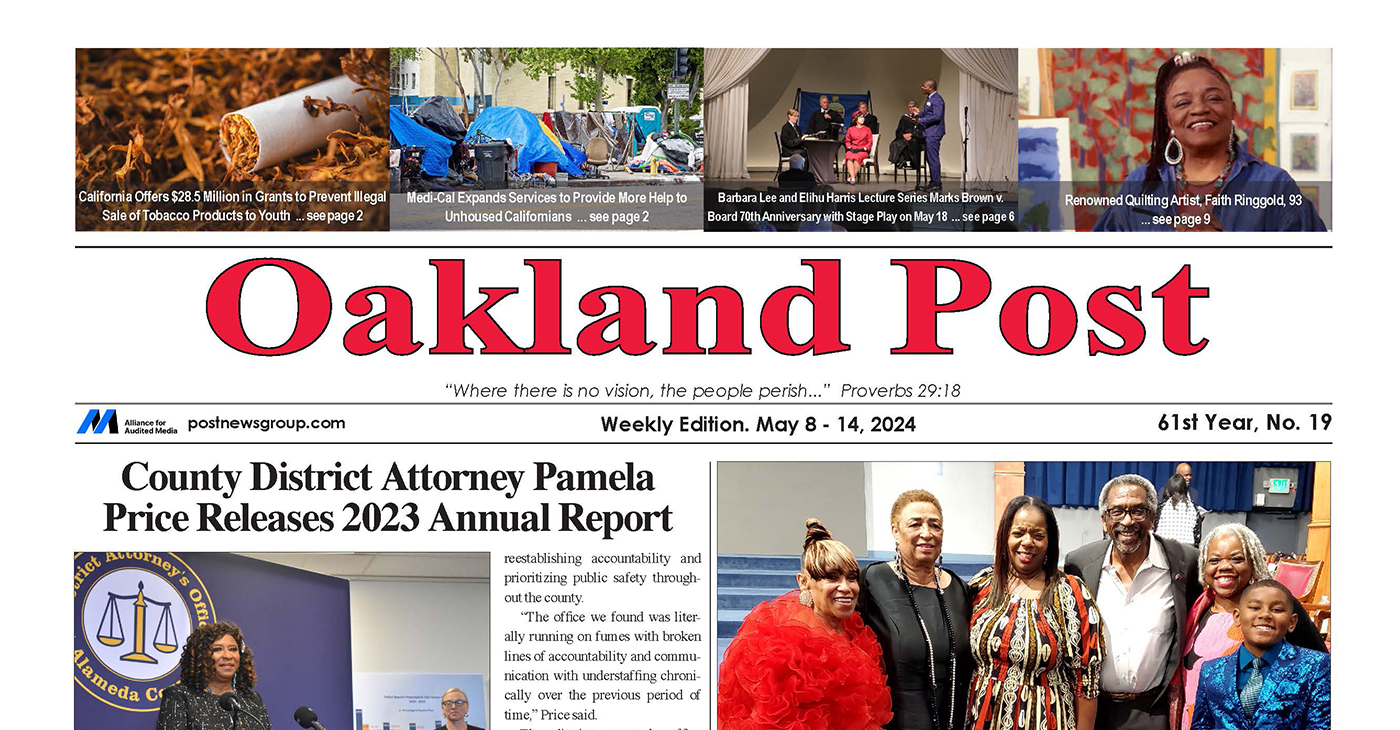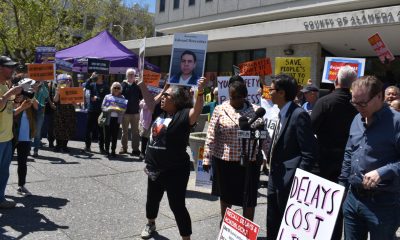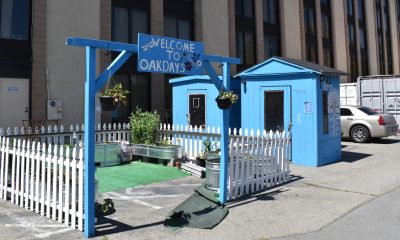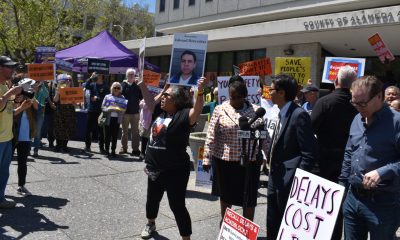California Black Media
California Black Media Political Roundup
Last week, Gov. Gavin Newsom and the Legislature reached an agreement on a state budget totaling $310.8 billion for the 2023-24 fiscal year. It came into effect July 1. The agreement includes provisions for trailer bills that support clean transportation, expanded Medi-Cal coverage, expedited judicial review, advanced mitigation by Caltrans, the conversion of San Quentin into a rehabilitation center and wildlife crossings on I-15, among other initiatives.

By Joe W. Bowers Jr. and Edward Henderson California Black Media
Your roundup of stories you might have missed last week.
Gov. Newsom, Legislature Agree on $310.8 Billion Budget
Last week, Gov. Gavin Newsom and the Legislature reached an agreement on a state budget totaling $310.8 billion for the 2023-24 fiscal year. It came into effect July 1.
The agreement includes provisions for trailer bills that support clean transportation, expanded Medi-Cal coverage, expedited judicial review, advanced mitigation by Caltrans, the conversion of San Quentin into a rehabilitation center and wildlife crossings on I-15, among other initiatives.
“In the face of continued global economic uncertainty, this budget increases our fiscal discipline by growing our budget reserves to a record $38 billion, while preserving historic investments in public education, health care, climate, and public safety,” said Newsom.
Negotiations had been delayed because of Newsom’s demands, including an infrastructure proposal that lawmakers opposed. A compromise was reached by limiting the types of projects eligible for expedited approval permits and excluding a proposed water conveyance tunnel under the Sacramento-San Joaquin River Delta.
“We started our budget process this time around with tough economic challenges, but one overarching goal: to protect California’s progress,” said Senate President pro Tempore Toni G. Atkins (D-San Diego).

Gov. Gavin Newsom. Official portrait.

Assemblymember Matt Haney (D-San Francisco), chair of the Rental Caucus, introduced Senate Bill 555 which aims to cap security deposits by no more than one month’s rent. Official portrait.
On July 1, California Officially Recognized Juneteenth as a State Holiday
On July 1, Assembly Bill (AB) 1655, which declares Juneteenth an official California state holiday, took effect.
AB 1655, introduced by Assemblymember Reggie Jones-Sawyer (D-Los Angeles), a member of the California Legislative Black Caucus, was signed into law by Gov. Newsom last September.
On June 19 of next year, California state employees can elect to take the day off work to commemorate the holiday celebrating the emancipation of formerly enslaved Black Americans.
California “Renters Caucus” Announces Pro-Tenant Bills
On June 29, The California Legislative Renters Caucus — a group of five lawmakers who are all renters — held a press conference to announce a package of bills aimed to protect the rights of tenants in California.
The Renters’ Caucus was formed in 2022 in response to the state’s dire housing crisis. This unique caucus is committed to ensuring that the interests of California’s 17 million renters are represented in state government.
Each member of the caucus is responsible for introducing a bill for consideration. Assemblymember Matt Haney (D-San Francisco), chair of the Rental Caucus, hosted the press conference and introduced Senate Bill (SB) 555. The bill aims to cap security deposits by no more than one month’s rent.
“Each of the pieces of our legislative agenda is addressing a different challenge that renters are facing,” said Haney.
Assemblymember Isaac Bryan (D- Ladera Heights), vice chair of the elections caucus, introduced AB 1248. This bill limits independent redistricting to fight gerrymandering.
Assemblymember Alex Lee (D-San Jose) introduced AB 309. The bill would set eligibility criteria for residents of social housing and establish a lottery system for selecting residents.
Assemblymember Tasha Boerner (D-Encinitas) introduced AB 548, which protects renters by giving more authority to inspectors to ensure safe living conditions.
Sen. Aisha Wahab (D-Hayward) introduced SB 555 which creates a practical, data-driven masterplan that outlines a plan to produce 1.2 million affordable housing units over the next 10 years.
Attorney General Bonta Releases 2022 Hate Crime Report: Blacks Still Most Targeted Group
California Attorney General Rob Bonta on June 27 released the 2022 Hate Crime in California Report. The document also highlighted resources to support ongoing efforts across the state to combat hate.
In California, hate crime events rose by 20.2% from 1,763 in 2021 to 2,120 in 2022.
Reported hate crimes targeting Black people remain the most prevalent and increased 27.1% from 513 in 2021 to 652 in 2022, while reported anti-Asian hate crime events decreased by 43.3% from 247 in 2021 to 140 in 2022.
Hate crimes involving sexual orientation bias rose by 29% from 303 in 2021 to 391 in 2022.
“This report is a stark reminder that there is still much work to be done to combat hate in our state. I urge local partners and law enforcement to review these findings and recommit to taking action,” said Bonta. “The alarming increases in crimes committed against Black, LGBTQ+ and Jewish people for the second year in a row illustrates the need for our communities to join together unified against hate.”
Controller Malia Cohen Updates her Office’s Compensation in Government
State Controller Malia M. Cohen published 2022 self-reported payroll data for cities and counties on the Government Compensation in California website. The data cover 688,912 positions and a total of more than $54.65 billion in 2022 wages.
Users of the site can view compensation levels on maps and search by region, narrow results by name of the entity or by job title and export raw data or custom reports.
The data covers 459 cities and 53 counties. The City of Hayward had the highest average city employee wage, followed by Pleasant Hill, Atherton, and Hillsborough.
Topping the list for highest average county employee wage were Alameda, Los Angeles, San Mateo, Monterey, and Sacramento counties.
The highest-salaried city employee in California was the City Manager for the City of Montebello. The top 25 highest-paid county employees work in health care.
Activism
Oakland Post: Week of May 8 – 14, 2024
The printed Weekly Edition of the Oakland Post: Week of May May 8 – 14, 2024

To enlarge your view of this issue, use the slider, magnifying glass icon or full page icon in the lower right corner of the browser window. ![]()
California Black Media
Cinco De Mayo: Five Interesting Facts You Should Know About the Popular Mexican American Holiday
To explore the historical significance of Cinco De Mayo, we step back to the origins of the commemoration, share how some Mexican American Californians regard it and trace how it has morphed into the celebrations we see today.

By Edward Henderson, California Black Media
To explore the historical significance of Cinco De Mayo, we step back to the origins of the commemoration, share how some Mexican American Californians regard it and trace how it has morphed into the celebrations we see today.
Celebrations in the United States began in 1862 in Columbia, California, a small town located in the foothills of the Sierra Nevada in Tolumne County, according to that town’s website.
Today, millions of Americans celebrate Cinco De Mayo annually with 120 official celebrations organized across the United States.
This day has become a cultural point of pride for Mexican Americans and other Latino communities in the United States. It serves as a time to affirm and celebrate their cultures with other Americans of all backgrounds as they highlight their contributions to American history and society.
Joseph Soltero, a Mexican American living in Escondido, shared his perspective on Cinco de Mayo with California Black Media. He learned about Cinco De Mayo from his grandfather and talked about the extent to which his family and San Diego County community celebrate the holiday.
“We knew September 16 was really Mexican Independence Day, but kids in my school would always mistake Cinco De Mayo as our Independence Day. [Cinco De Mayo] is not really even a Mexican holiday,” said Soltero. “It’s something people do to have an excuse to buy drinks, have fun and spend a little money at taco shops.”
Like Soltero, many Mexican Americans (and other Latino Californians) do not take the support and solidarity they receive from people of other races on Cinco De Mayo for granted. They also appreciate when people take the time to learn about the cultural significance of the day and avoid some of the cultural tropes that can easily whisper undertones of racism.
To help raise your awareness about the origins and cultural significance of the day, here are 5 little known facts about Cinco De Mayo:
- Cinco De Mayo is not Mexican Independence Day. It is the anniversary of the Battle of Puebla. This military victory on May 5, 1862, over the French forces of Napoleon III was hailed as a symbol for Mexican resistance to foreign influence.
- The holiday was not given much historical significance outside of Puebla, and it has not been celebrated on a large scale in Mexico. However, during the Civil War, Mexican Americans in California, Oregon and Nevada who supported the Union drew inspiration from the victory over the French-backed Confederate forces.
- The Chicano civil rights movement in the 1940s gave a new energy to celebration of the holiday in the United Sates as a symbol of national pride.
- In the 1980s and 1990s, beer companies’ marketing strategies targeted Mexican Americans by encouraging them to celebrate their heritage – and Cinco De Mayo –with Coronas, Bud Light, and Dos Equis. This created the perceived connection between Cinco De Mayo, alcohol, and merrymaking.
- Los Angeles hosts the largest Cinco De Mayo celebration in the country.
As we join Mexican American Californians to celebrate Cinco De Mayo next week, let’s deepen our cultural understanding.
Let’s use this occasion to commit to learning more about our neighbors, colleagues and friends of other races and ethnicities.
This resource is supported in whole or in part by funding provided by the State of California, administered by the California State Library in partnership with the California Department of Social Services and the California Commission on Asian and Pacific Islander American Affairs as part of the Stop the Hate program. To report a hate incident or hate crime and get support, go to CA vs Hate.
Antonio Ray Harvey
Working Group: More Entry-Level Homes Could Help Solve Housing Crisis
The Community Housing Working Group hosted a briefing on April 23 at Cafeteria 15L in Sacramento. Discussions focused on how the housing crisis in California affects Black and Brown communities and explored ways to provide low-income families and individuals with affordable housing.

By Antonio Ray Harvey, California Black Media
The Community Housing Working Group hosted a briefing on April 23 at Cafeteria 15L in Sacramento. Discussions focused on how the housing crisis in California affects Black and Brown communities and explored ways to provide low-income families and individuals with affordable housing.
Tia Boatman Patterson, CEO and President of the California Communities Reinvestment Corporation, said “entry-level housing” is not available as it was in the past, adding that affordable units were a major point of entry into homeownership for many families in the Black community.
“My mother bought her first house when I was in junior high. It was an 850-square foot, two-bedroom and one-bathroom house in 1978. That house cost $30,000,” Boatman-Patterson said.
“A woman working part-time at JCPenney was able to afford that house. We don’t build these types of housing now. We do not build entry-level homeownership,” she added.
The Community Housing Working Group is a collection of diverse community organizations from across California working together to address housing challenges in their communities. The organization believes that solving the affordable housing crisis will require creating enough smaller, lower-cost, multi-family homes located near jobs, transit, and good schools.
The briefing included a panel discussion titled, “Exclusionary Zoning: A Look Back and a Path Forward.” Boatman-Patterson participated in that session along with Henry “Hank” Levy, Treasurer-Tax Collector for Alameda County, and Noerena Limón, consultant, Unidos U.S., and Board Member of California Housing Finance Agency.
Boatman-Patterson, a former Associate Director for Housing, Treasury and Commerce in the Office of Management and Budget for the Biden Administration, started her presentation by highlighting how exclusionary single-family zoning is contributing to continued segregation of California communities.
She said that single-family zoning originated in the Bay Area city of Berkeley in 1916.
“By creating single-family zoning and having fenced-off communities, you were able to exclude the ‘others,’” Boatman-Patterson said. “It really was a method to exclude — what they called ‘economic segregation’ — but that was a guise for racial segregation. Single-family zoning, along with redlining, became a systemic approach to exclude based on affordability.”
Title VIII of the federal Civil Rights Act of 1968 — commonly known as the Fair Housing Act of 1968 – is the U.S. federal legislation that protects individuals and families from discrimination in the sale, rental, and financing of housing. It was passed to open the doors to affordable housing.
In 1968, 65.9% of White families were homeowners, a rate that was 25% higher than the 41.1% of Black families that owned their homes, according to National Low-Income Housing Coalition. Today, those figures have hardly changed in the Black community, although White homeownership has increased five percentage points to 71.1%.
Boatman Patterson said the rate has not changed in Black and Brown communities because financing for affordable entry-level homes is almost nonexistent. The homeownership disparities contribute to the disturbing racial wealth gap in the nation, according to the National Low-Income Housing Coalition’s October 2018 report.
“We really must align the financing with the actual building of units, which we haven’t necessarily done. Because of this misalignment, I think we continue to see problems,” Boatman-Patterson said.
-

 Community3 weeks ago
Community3 weeks agoFinancial Assistance Bill for Descendants of Enslaved Persons to Help Them Purchase, Own, or Maintain a Home
-

 City Government7 days ago
City Government7 days agoCourt Throws Out Law That Allowed Californians to Build Duplexes, Triplexes and RDUs on Their Properties
-

 Activism2 weeks ago
Activism2 weeks agoOakland Post: Week of April 24 – 30, 2024
-

 Business4 weeks ago
Business4 weeks agoV.P. Kamala Harris: Americans With Criminal Records Will Soon Be Eligible for SBA Loans
-

 Activism4 weeks ago
Activism4 weeks agoOakland Post: Week of April 10 – 16, 2024
-

 Community4 weeks ago
Community4 weeks agoAG Bonta Says Oakland School Leaders Should Comply with State Laws to Avoid ‘Disparate Harm’ When Closing or Merging Schools
-

 Community3 weeks ago
Community3 weeks agoRichmond Nonprofit Helps Ex-Felons Get Back on Their Feet
-

 Community3 weeks ago
Community3 weeks agoOakland WNBA Player to be Inducted Into Hall of Fame


















































